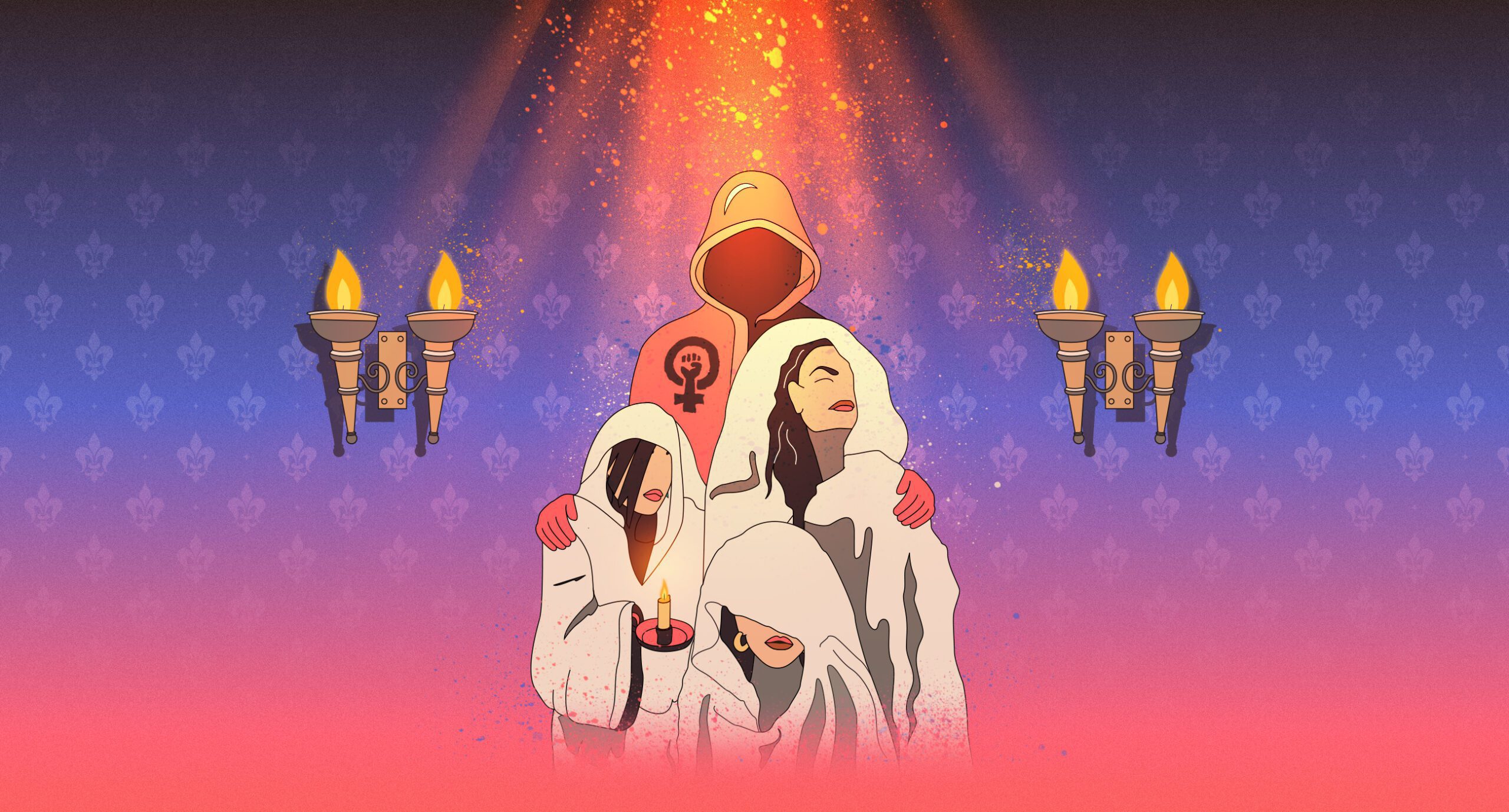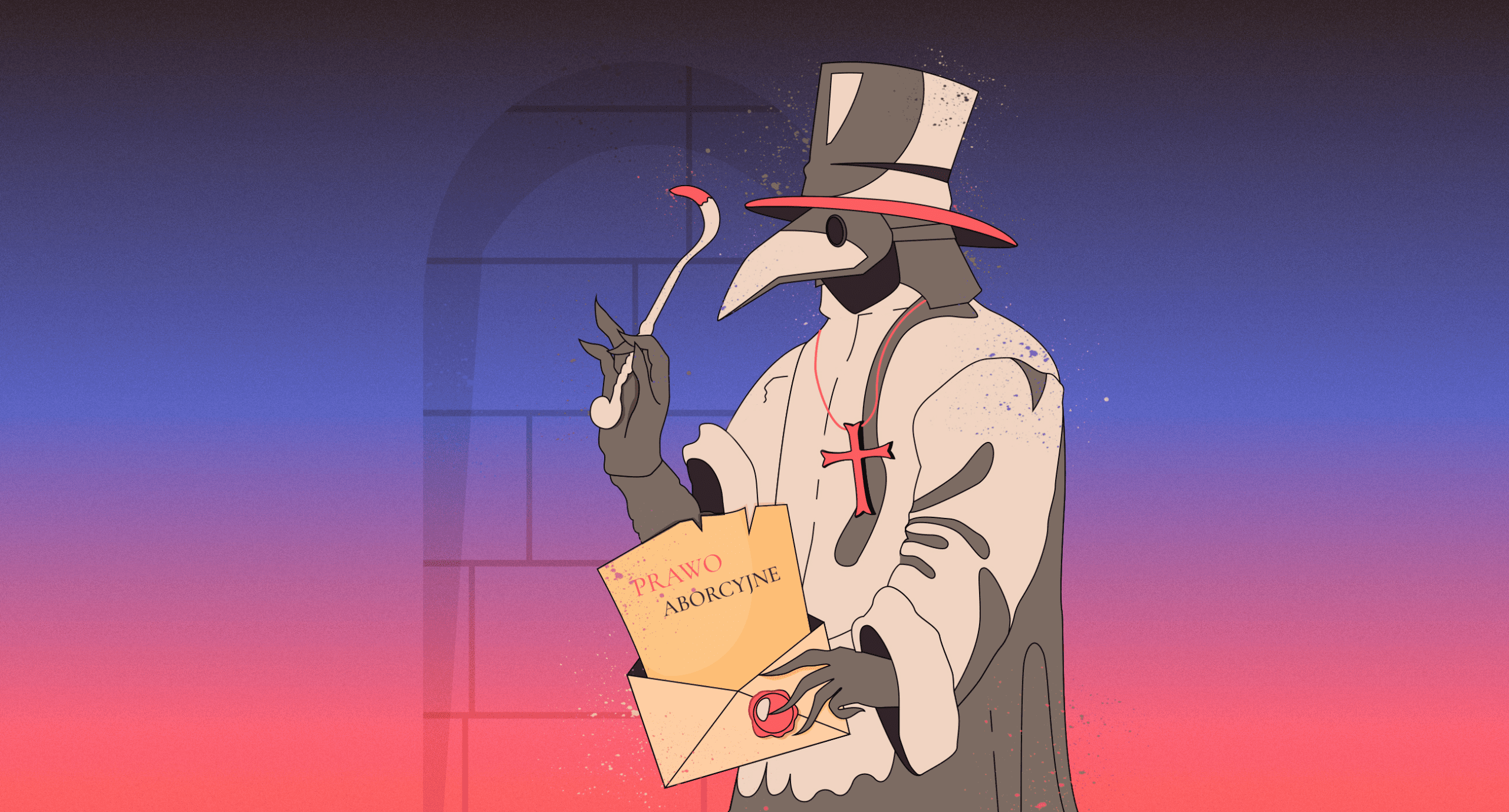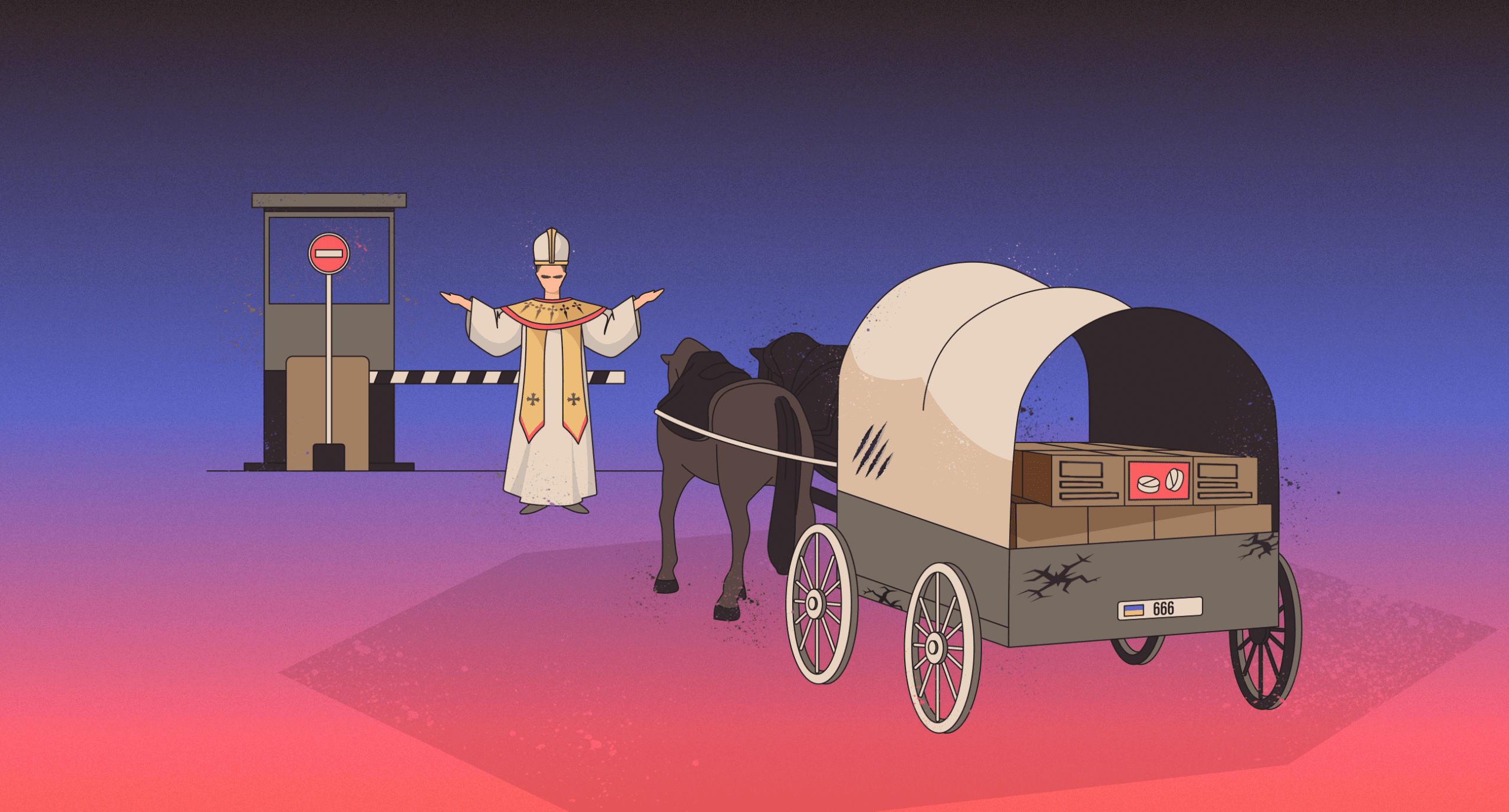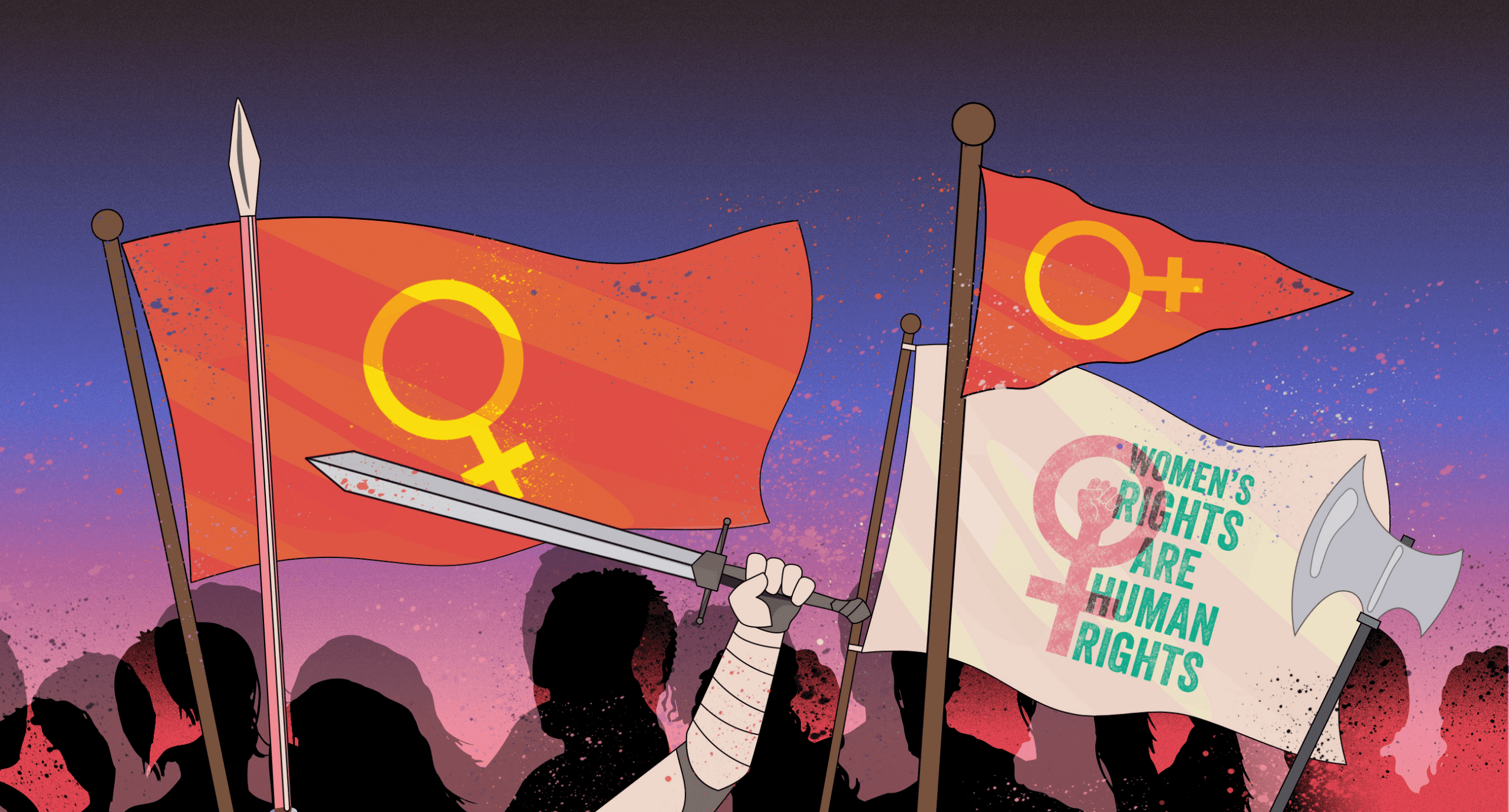Poland has some of the strictest abortion regulations in Europe. A year ago, the Polish government passed another law that practically bans artificial termination of pregnancies. Because of this, Poles have been forced to look to other countries for abortions. Zaborona journalist Nastya Podorozhnaya, who lives in Poland and has been tracking the abortion issue closely, explains how Polish women have been managing in the wake of this unprecedented law, and with whose help.
In 2000, Polish citizen Alicja Tysiąc discovered that she was pregnant. She already had two small children. Her strong myopia forced her to wear glasses with very thick lenses. Tysiąc spoke to three different opthamologists – they all warned her that if she was to carry her pregnancy to term, she would be at risk of blindness.
Alicja wanted to terminate her pregnancy. She was a single mother, and even a small decrease in visual acuity could interfere in her ability to care for her children. At that time, abortion in Poland was permitted in three cases: as the result of a crime (incest or rape), if the fetus had congential anomalies, and if the pregnancy posed a risk to the life of the mother. Alicja fell under the third category, but in order to receive a legal abortion, she would need a written statement from a doctor.
Three opthamologists all refused to write such a statement. They believed that the risk to Alicja’s vision could be minimized if the fetus was delivered via Cesarean section, meaning that Alicja would “have to” continue her pregnancy. However, Alicja was reluctant to have a third C-section. In a statement, a therapist confirmed that a natural birth could lead to further vision problems for Alicja, while a C-section, considering Alicja’s health and previous experiences, could lead to a uterine rupture.
Alicja booked herself for a hospital stay in Warsaw, where she lived. She was seen by the head of the hospital’s obstetrics and gynecology department, a well-known Polish professor named Romuald Dębski. Dębski decided that a C-section would not pose an undue risk to Alicja’s health, and refused to recommend abortion. This was written on the back of Alicja’s conclusion statement.
Alicja was, as a result, forbidden from seeking a legal abortion in Poland, but the option of going abroad or seeking an illegal abortion wasn’t considered. “In 2000, I would have had to pay 5,000 złoty (approx. $2,000 in 2021 U.S. dollars) for an underground abortion. This was an enormous sum for me, it would have been impossible to get,” she said in an interview with gazeta.pl.
In November 2000, Alicja Tysiąc gave birth to a child via C-section. Her vision had rapidly deteriorated by early 2001: she could not see further than 1.5 meters ahead. She was assigned the first degree of disability.
Alicja became the first woman in modern Poland to openly speak about her experiences of being rejected for an abortion and the dire consequences of giving birth. Now, twenty years later, she not only takes part in the pro-abortion protest movement in Poland, but remains the only Polish woman to win an abortion case at the European Court of Human Rights.

Illustration: Artem Markov / Zaborona
Everyone suffers
Abortion law in Poland has only gotten stricter in the twenty years since Alicja Tysiąc’s attempt. In 2020, the Polish Constitutional Court banned abortions in situations of severe fetal abnormalities, even if the child is expected to perish shortly after birth. Agnieszka Borowska, an MP from a pro-government party, explained in February that her faction was working to organize “rooms where you can cry” in hospitals, for women forced to birth dying children.
Poland joined the European Union in 2004, and in 2005 E.U. residents were granted visa-free travel to Ukraine. This is when the term ‘abortion tourism’ began appearing in Polish, and that phrase soon appeared in Russian and Ukrainian lexicons as well. The scale of abortion tourism is impossible to judge: pregnant people typically hide the reason for their travel if their aim is to obtain an abortion. The demand, however, is so large that clinics in Slovakia, Austria, and Germany are gathering entire departments of Polish-speaking employees and consultants.
Antonina (her name has been changed at her request – ed.) lives in Kraków. She used to live in Ukraine, and had to have an abortion due to congenital fetal abnormalities. This is legal – in Ukraine, abortions can be performed at up to 12 weeks at the request of the patient, and at up to 22 for medical reasons.
Antonina, along with her husband, want to try for another child – this time in Poland. “If, for some reason, abnormalities are discovered, considering these idiotic Polish laws, I may have to go home. I feel that this topic of an abortion ban may potentially impact me as well,” Antonina told Zaborona.
Despite the fact that Ukraine is situation quite close to Poland, not a single organization in country that could intentionally help Poles (or citizens of other countries with strict abortion laws) terminate their pregnancies. Patients are forced to find clinics and lodging themselves, or travel to their friends or relatives. However, if the trip is discovered by Polish law enforcement, then the friends and/or relatives may have problems – and these situations have already occurred.
A twenty year old Polish citizen used to live on the Polish border with the Ukrainian oblast of Volyn – her boyfriend and mother received criminal sentences in 2012 for “persuading” the girl to get an abortion. Her boyfriend was sentenced to six months imprisonment for taking her to have the procedure done in the Ukrainian city of Volodymyr-Volynsky, and lending her a few hundred zloty. Her mother, for “double-dipping” in abortion (her daughter had two abortions), was sentenced to a year.
Ukraine for pills
Tatyana Hruschevkaya, a Ukrainian midwife and gynecologist, recently helped out an Ukrainian acquaintance living in Poland. Tataya helped the girl get an abortion – she gave her friend abortion pills, passed along through acquaintences traveling from Ukraine to Poland.
“The first pills are taken to prepare the cervix, in order to soften it,” explains Hruschevskaya. “The next are for the uterus to begin to contracting to cause a miscarriage. In order for a woman to be psychologically ready for this, she and I take these pills while online. I talk to her and explain what could happen to her. Luckily, everything went very well. To be honest, if she wasn’t an acquaintance of mine, I would not have decided to help her remotely.”
In Ukraine, unlike Poland, women can freely buy pills to induce a medical abortion, as well as emergency contraceptives. Starting from 2017, it’s been impossible to buy classic medications such as Postinor or Escapelle (the brand names for medications known as Plan B or the morning-after-pill in the U.S. – ed.), which work up to three days after the act, in Poland. The governing conservative party, PiS or Law and Justice, has banned the sale of any emergency contraceptives without a doctor’s prescription. However, getting that prescription can take upwards of two to three weeks after registration at a government clinic.
“We immediately found the name of a specific medicine and asked acquaintances in Ukraine to buy it. We passed it through buses, through the drives – this was the fastest way,” Yuliya, who lives in Poland, tells us.
The package containing the pills had to be hidden as traditional family parcels, with chocolates and over-the-counter vitamins – otherwise, Polish border guards may have refused to let the package through.
Buying the pills for yourself, keeping them at home and using them if necessary is necessary, however, but helping out a friend is not. Helping someone receive an abortion is considered a criminal act in Poland, and the country has handed down real prison sentences for the act. For example, a 35 year old man was sentenced to six months imprisonment because he gave his girlfriend money for a medical abortion. If she’d bought the pills herself, there would have been no punishment.

Illustration: Artem Markov / Zaborona
Poles supporting Poles
Alicja Tysiąc says that from the moment she was forced to give birth, networks support women who want an abortion have only strengthened in Poland. “Fortunately, there are currently many organizations that help women. There’s the ‘Abortion Dream Team’, ‘Auntie Czesia’, and many others,” she says.
Jolanta (her name has been changed in the interests of safety – ed.) is a volunteer at Auntie Czesia, or Ciocia Czesia in Polish. She was born in Poland, but currently lives in Czechia. When the protests in support of legal abortion in Poland started last year, Jolanta joined protesters in front of the Polish embassy in Prague.
“For us and the other protesters from Czechia, it was depressing that we couldn’t join the street protests in Poland. But then we decided that life abroad could, on the contrary, be a benefit,” recalls Jolanta.
That’s how Auntie Czesia got started – an organization that can provide trustworthy information on abortions, as well as arrange travel to Czechia for surgical abortions and receive moral and financial assistance. Auntie Czesia finances these abortions for anyone that asks – this currently takes up around 15% of the organization’s financing.
Jolanta didn’t know a single colleague of hers from Auntie Czesia until the organization was founded. “We met entirely in person somewhere after half a year of Czesia’s existence – before that, we had calls via the internet. Now these are my closest friends,” says the woman.
Nonprofits that help Poles receive abortions have yet to run afoul of Polish criminal law. Zaborona has previously reported on this with Karolina Buczko, a human rights defender from Poznań.
“In order for an organization to be criminally charged, [the Polish authorities] would have to prove that help was given to a specific woman they know. Sharing information online or providing consultations via an anonymous hotline doesn’t violate the law,” she says.
A fairy godmother for everyone
Auntie Czesia is in fact the ‘younger sister’ of other organizations with the same mission – Auntie Basia (Ciocia Basia) from Germany and Auntie Wienia (Ciocia Wienia) from Austria. Auntie Basia was the first: this collective was created in Berlin in 2014. It was founded by Polish migrants and Germans who wanted to “use their privilege of life abroad”, in order to help others receive abortions. Agnieszka, one of the “oldest” current members of these organizations (her last name has been withheld in the interests of security – ed.), spoke to Zaborona about them.
At first, Auntie Basia had a single telephone for the entire group. One of the members had to constantly carry it with her and answer calls. “It was very difficult and hard,” remembers Agnieszka. Regardless of how difficult a previous conversation could be, if a new call followed immediately after, she had to pick up. “That’s not even mentioning that everyone, aside from activism, had their own paid jobs and just, life,” says Agnieszka.
Now, thanks to the help of a specialized app, each call can be taken in order from different phones. The group’s members have telephone and email hours, with two to three people manning each. “Sometimes we have ten calls per day, sometimes two. The same with email. The workload significantly increased after the laws were tightened last fall,” says Agnieszka.
Ten to twenty people come to Berlin for surgical abortion through Auntie Basia each month. Yet there are a lot more calls and letters: someone orders pills, someone is redirected to other organizations (wherever it’s easier for that specific person to receive an abortion), while calls sometimes drop for others.
In July 2021, 87 people turned to Auntie Czesia for advice or help. These appeals grow each month: the number is 2.5 times higher than in April. The reason is Auntie Czesia’s growing reputation, believes Jolanta.
The name ‘Auntie’, for all these organizations, is a metaphor for a relative that you can turn to for help – when it’s too shameful to discuss the situation even with your mother. There’s a lot of shame on Auntie Basia’s hotlines, Agnieszka tells us. “Sometimes there are ‘hide and seek’ – a single day trip so that no one figures out where you went. There are stories of violence, when a partner attempts to stop an abortion.”
The hardest situations
Fetal abnormalities can be discovered during approximately the twelfth week of pregnancy, during an ultrasound. Additional analyses are done in order to confirm the defects. A final diagnosis can be received even after fifteen weeks.
“Often, these are planned children,” says Jolanta. For her, those types of situations are the hardest in her work. She’s been asked several times if the aborted fetus could be taken back to Poland for burial. “That transfer needs to be done via a specialized company. The price is around 4,000 zloty ($1,030), plus the abortion itself costs 2,000 zloty ($516). While there have been some people for whom it’s important to say goodbye, in our experience it hasn’t happened, for someone to decide to ship the fetus. It’s expensive and complicated,” explains the activist.
Agnieszka also says that her most draining emotional stories are usually tied to abortions done for embryopathological reasons. And it’s hardest for her to give support in situations that involve rate. “I get angry – I want to punish the rapist somehow. But many victims of sexual violence don’t want to do anything – for example, go to the police – and I have to respect this,” she says.
Agnieszka has never been asked how to bury a fetus after an abortion. The opposite happened, in fact – in 2017, a resident of the Polish city of Szczecin turned to Auntie Basia, who, after a legal abortion, was forced to participate in a funeral at the hospital. “The woman wanted this child, but the hospital-imposed funeral forced her to relive this trauma. This was just horrible. She said that she was asked if she wanted to leave some things with the child on its last voyage. Later we discovered that this hospital was likely cooperating with a funeral agency,” Agnieszka tells us.
Not enough credible information
“People are afraid of a lot of things before the procedure,” Jolanta recalls from her conversations with Poles, “Foremost is pain, even though surgical abortions are done under anaesthetic. The lower half of your tummy feels strange after an abortion, but this is equivalent to menstrual pains. They’re also afraid of how to lie at work, in order for no one to find out about the real reasons for an off or sick day. They’re afraid of leaving the children with someone while they’re not there. They’re scared of toxic partners, violence. It even happens that in the last moments, the women can decide to cancel the abortion, because their partner forbid it.”
Under conditions of anonymity, an activist with a pro-choice organization told Zaborona that the husband of one of the women who turned to theme or help was taken home for a ‘meeting’ with a local Catholic clergyman, in order to convince her to not have an abortion. It’s not entirely clear what the result of that meeting was – but the woman stopped respond to messages from the organization she had turned to for help.
It’s acceptable in Poland to talk about sin and crime in regards abortions in Poland, Agnieszka believes. This is reflected in the well-being of people with unplanned pregnancies: “They can feel that they don’t have a right at all to talk about their needs. That’s why they can’t talk to their partners about what they need and what they want in this situation,” the activist says.
In 2018, the cover of Polish woman’s magazine Wysokie Obcasy was released featuring a Polish activist wearing a t-shirt with the phrase “Abortions are okay.” The words were scandalous “even for liberals,” wrote Newsweek.

Illustration: Artem Markov / Zaborona
“This is a cover about the fact that there are women for whom abortions are not a trauma. For them, it would have been traumatic in that time of their life to birth a child. And there’s no need to stigmatize them for the fact that they weren’t traumatized by an abortion,” explains Wysokie Obcasy editor-in-chief Ewa Wieczorek.
“Abortion, from the viewpoint of possible complications, is rather safer than giving birth,” says Jolanta. “In our experience, there has yet to be a single serious complication following a surgical abortion. Complications are in general rare and not serious – meaning that they don’t have long-term consequences. For example, for fertility.”
Most commonly, Jolanta and Agnieszka hear from their wards, following an abortion, that they feel relieved. “I rarely receive some sort of feedback other than happiness and relief,” admits Agnieszka. “Maybe these people just decide not to share their worries, but no one has written a single time, ‘I regret my abortion.”
Hope for each other
Doctor Romuald Dębski, who forbid Alicja Tysiąc from having an abortion, until the end of his life claimed to the press that he had “saved Alicja Tysiąc’s child.”
Alicja told Zaborona that she’s currently working on her health while taking care of her three year old disabled granddaughter, which is why she isn’t ready to provide an interview. Alicja won 25,000 EUR in compensation as a result of the ECHR case back in 2007. She’s gone through multiple operations to restore her sight – but not a single one has worked.
This summer, Alicja is trying to gather 20,000 zloty through crowdfunding for a vitrectomy – an operation meant to remove a vitreous body from the eyes. The crowdfunding description reads: “This operation is my last chance. At the moment, one eye is soaked in blood and I can’t see a thing. The wait in a government clinic for a free operation, in my case, is too long.”
There’s little chance that abortion regulations will weaken in the short-term. “The Constitutional Court’s decision is final, it’s impossible to annul,” explained human rights defender Buczko. The only thing a woman who has been refused an abortion in Poland can do is to turn to the European Court of Human Rights, as Alicja Tysiąc did.
Auntie Basia and Auntia Czesia are currently able to pay for all the abortions they’re asked to help with. Through crowdfunding, the Aunties receive donations both from Poland and abroad. “Yesterday I received a letter from a person who asked for our information, in order to write our organization into their will. This touched me deeply,” Agnieszka says. “The other letter from yesterday were from people I personally coordinated with in Berlin last week. Now she writes that everything is well with her and we saved her life. In these moments you understand why you work here.”
Aunties are constantly springing up everywhere there are many Polish migrants. Just in Germany, there is Auntie Mona from Munich, Hana from Hamburg, Frania from Frankfurt, and others. This makes Agnieszka very happy: she works in the first group that began helping women with abortions abroad.
“People are very mobilized. We’ve recently been contacted from Slovakia, saying something like ‘Tell us how to create an organization like this – we’ll also make one, seeing as we’re on the Polish border.’ These people didn’t even speak Polish!” Agnieszka shares.

Illustration: Artem Markov / Zaborona
With the support of Mediaset









